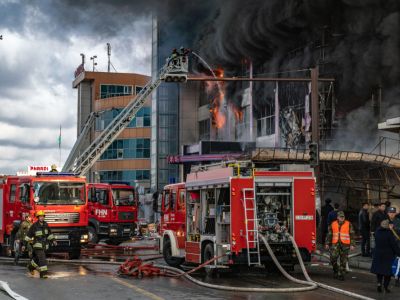A joint meeting of Pakistan's cabinet and National Security Council convened Saturday to discuss Washington's requests for assistance in tracking down alleged terrorist Osama bin Laden in Taliban-ruled Afghanistan.
Pakistani President Pervez Musharraf, wearing his uniform as general and military chief, asked his civilian and military chiefs to observe a minute's silence for the victims of Tuesday's terror attacks in the United States.
"First of all, I'll take this opportunity to request that all of you join me in a minute of silence ... [for] all the innocent people, the thousands of innocent people killed in this terrorist attack in the United States," he said in his opening statement.
He said the attacks on the World Trade Center in New York and the Pentagon in Washington killed "thousands of innocent people from all over the world, people of all religions, and, may I also add, people of all ages, children, young men, women and old people".
Pakistan's military core commanders, the most powerful group in the military-led government which has ruled the fledgling nuclear nation since Musharraf's coup in October 1999, met Friday to examine a response to Washington's requests.
Musharraf had earlier offered Pakistan's full cooperation to the United States, which is understood to have asked for intelligence information on bin Laden as well as permission to use Pakistani air space in the event of military strikes against his bases in Afghanistan.
But he is facing opposition from certain factions of the military, domestic Islamist movements and Afghanistan's ruling Taliban militia, which earlier Saturday threatened its neighbours with war if they cooperate with US strikes.
"The possibility of a massive attack by our mujahideen [holy warriors] cannot be ruled out if any neighbouring country offers its ground or air bases to US forces," a Taliban foreign ministry statement said.
"It's possible that we will invade any country that provides access to the US. Our mujahideen will force their way into their territory.
"The responsibility for the grave consequences and instability of the region would then rest with them."
There have also been mounting opposition from local Islamist groups as the possible fallout from Tuesday's attacks becomes clear.
"US intelligence agencies and the media are trying to involve Osama, the Taliban and Muslims without any evidence," right-wing Urdu-language newspaper Ummat reported Saturday.
"If the US takes any action against Pakistan and Afghanistan on the excuse of getting Osama, it will make over one billion Muslims its enemy."
Islamabad is expected to make some requests of its own in exchange for cooperation with Washington, such as the relaxation of US sanctions imposed over its nuclear programme and the military coup here in October 1999.
Pakistan's influential intelligence service enjoys close links to the Taliban, reportedly providing it with technical advice, weapons and supplies.
The government denies such active collusion but close ties to the dominant political force in its unstable neighbour has long been a cornerstone of Pakistani foreign policy.
The scale of the attacks on the United States however has transformed the geo-political landscape and Pakistan knows it could pay dearly -- particularly in economic terms -- if it refuses to go along with Washington's demands -- ISLAMABAD (AFP)
© 2001 Al Bawaba (www.albawaba.com)









